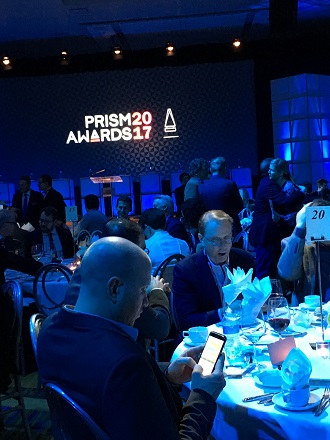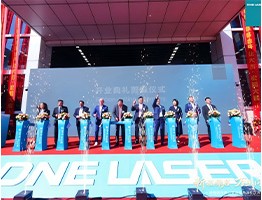Congratulations to Prism Awards 2017 Winners
source:photonics.com
keywords:
Time:2017-02-07
Known as the Oscars of the photonics industry, the Prism Awards for Photonics Innovation each year highlight the best of the best. And the competition is fierce — from the first femtosecond fiber laser-pumped mid-IR supercontinuum source to a drone-mounted natural gas surveillance system for indoor natural gas leakage inspection and a unique optical component technology that can sense nanovibrations of the body with very high precision.

The industry’s top companies and products are chosen by a panel of judges who represent all fields of photonics. The awards — co-sponsored by Photonics Media and SPIE — were handed out during the annual gala event at Photonics West in San Francisco.
The 2017 Prism Award winners are:
Additive Manufacturing/3D Printing
The Tungsten-LAM, developed by Polaronyx Inc., employs a femtosecond fiber laser as an energy deposition source for 3D printing. It combines additive and subtractive manufacturing in a single platform via one tunable pulsed fiber laser. The company has found this significantly reduces the cost and time required for 3D metal and ceramic printing by eliminating separate post-processing. This system also enables layer-by-layer modification to create complex structures that have previously not been possible.
The company notes that this is the first femtosecond fiber laser-based 3D printing machine. It can be used with high-temperature materials, a function that differs from existing additive manufacturing technologies, which are limited to lower temperatures and always need post-processing.
Biomedical Instrumentation
The TB Breathalyser, from Rapid Biosensor Systems, is the first biophotonics system available for noninvasive testing for active infectious diseases (namely tuberculosis). The novel system integrates laser, optical and engineering design with medical requirements for fast, breath-based testing. It will be effective for screening people in rural communities, the company notes, and in Europe and North America it has the potential to support screening programs at ports of entry, prisons, military establishments and schools, ultimately prompting lower health care costs.
The system has already been accepted by tuberculosis medics in India and Ethiopia as the fastest test for active infectious tuberculosis with high sensitivity and specificity >95 percent.
Detectors and Sensors
GoSpectro, developed by Alphanov, is a universal device that connects to any smartphone or tablet, turning it into a compact, easy-to-use, cost-effective light spectrometer. It makes possible the characterization of light sources (LEDs, etc.), displays, tunable lasers, optical filters or fluorescent dyes in a matter of seconds. It is a handheld tool that also measures emission and absorption peak wavelengths, cut-off wavelengths or spectral bandwidth, and enables material analysis (e.g., gemstones, crystals), or chemical analysis in liquids associated with color-based reagents for assessing water or food quality.
GoSpectro users can measure spectra, adjust acquisition parameters, display and save spectral data. Spectra are measured from 400 to 750 nm, with a resolution of <10 nm and an accuracy of <1 nm.
Imaging and Cameras
The first device to capture and process a full multi-megapixel hyperspectral data cube without the need for external processing, the new Handheld Hyperspectral Imager Model 4100, by TruTag Technologies Inc. essentially displaces existing multispectral imagers, which trade off spectral resolution for spatial resolution.
This new handheld imager allows users to dynamically select acquisition wavelengths that are not necessarily contiguous. It offers real-time processing, as well, the company notes, enabling processing for object identification and characterization. The camera can also identify and decode TruTag’s optical memory microparticles, decode their spectra, and authenticate the origin of things like foods and pills.
Industrial Lasers
The Ultra-short Pulsed Seeder for Fiber Laser, from QD Laser, features a less than 10 ps optical pulse, which, according to the company, “has been strongly needed.” And its ultra-short pulsed seed laser is one of the key components for MOPA (Master Oscillator Power Amplification)-type fiber lasers.
By designing this laser chip and high-speed module, the company notes that next generations of such short optical pulse become possible. These lasers can be used for nonthermal precise microprocessing and have become a strong competitive light source to mode-locked lasers. Other advantages such as flexible tuning of repetition rate and high reliability are also possible, enabling “an enormous impact for the progress of the precise microprocessing technology.”
Materials and Coatings
Crystalline Mirror Solutions has developed the xtal mir, a “crystalline supermirror” coating that is based on substrate-transferred, single-crystal semiconductor multilayers. This novel technology exhibits a number of advantageous properties, according to the company, including a 10× reduction in Brownian noise, the highest thermal conductivity (~30 Wm−1K−1 compared to <1 Wm−1K−1 for SiO2/Ta2O5).
This new technology targets ultralow-loss mid-IR optical coatings for the 3- to 5-µm wavelength range. The coatings are designed for high finesse optical cavities for power enhancement and signal recycling, enabling previously unachievable signal-to-noise ratios in the measurement of trace gases.
Metrology
Leica Geosystems has developed the Leica BLK360 Imaging Laser Scanner, “a technological leapfrog and a picture of creative expression.” It provides users a unique ability to capture the reality around them in a way that was previously impossible.
The new device touts faster tablets, virtual reality goggles, ubiquitous bandwidth and awareness of laser scanning. It generates massive amounts of content, for use in applications such as reality capture for virtual retailing, space mapping, and stage calibration for films and the visual arts. The laser scanner provides a degree of miniaturization that has never been seen before, allowing users to spend more time analyzing data and less time performing scans. The technology ranges up to 60 m, which can be measured with a precision of a few millimeters.
Optics and Optical Components
NuBEAM Flat-Top fiber technology, developed by Nufern, offers simplified system integration, improved efficiency, reproducibility and reliability of performances, as well as a smaller footprint and less expensive execution. According to the company, the new flat-top fiber technology offers an all-fiber solution designed as a simple drop-in replacement, compared to existing beam shaping techniques that are based mainly on free-space systems or complex optical assemblies.
The new technology employs well-established advantages of optical fiber technology — easy integration, efficient light transmission, robustness over time, small footprint, low maintenance and cost-effectiveness.
Scientific Lasers
The Mid-Infrared Supercontinuum Laser, developed by Thorlabs Inc., is a compact MIR-SC laser designed to accelerate instrument development in the mid-IR market. It is the first such femtosecond fiber-laser pumped source on the market.

The industry’s top companies and products are chosen by a panel of judges who represent all fields of photonics. The awards — co-sponsored by Photonics Media and SPIE — were handed out during the annual gala event at Photonics West in San Francisco.
The 2017 Prism Award winners are:
Additive Manufacturing/3D Printing
The Tungsten-LAM, developed by Polaronyx Inc., employs a femtosecond fiber laser as an energy deposition source for 3D printing. It combines additive and subtractive manufacturing in a single platform via one tunable pulsed fiber laser. The company has found this significantly reduces the cost and time required for 3D metal and ceramic printing by eliminating separate post-processing. This system also enables layer-by-layer modification to create complex structures that have previously not been possible.
The company notes that this is the first femtosecond fiber laser-based 3D printing machine. It can be used with high-temperature materials, a function that differs from existing additive manufacturing technologies, which are limited to lower temperatures and always need post-processing.
Biomedical Instrumentation
The TB Breathalyser, from Rapid Biosensor Systems, is the first biophotonics system available for noninvasive testing for active infectious diseases (namely tuberculosis). The novel system integrates laser, optical and engineering design with medical requirements for fast, breath-based testing. It will be effective for screening people in rural communities, the company notes, and in Europe and North America it has the potential to support screening programs at ports of entry, prisons, military establishments and schools, ultimately prompting lower health care costs.
The system has already been accepted by tuberculosis medics in India and Ethiopia as the fastest test for active infectious tuberculosis with high sensitivity and specificity >95 percent.
Detectors and Sensors
GoSpectro, developed by Alphanov, is a universal device that connects to any smartphone or tablet, turning it into a compact, easy-to-use, cost-effective light spectrometer. It makes possible the characterization of light sources (LEDs, etc.), displays, tunable lasers, optical filters or fluorescent dyes in a matter of seconds. It is a handheld tool that also measures emission and absorption peak wavelengths, cut-off wavelengths or spectral bandwidth, and enables material analysis (e.g., gemstones, crystals), or chemical analysis in liquids associated with color-based reagents for assessing water or food quality.
GoSpectro users can measure spectra, adjust acquisition parameters, display and save spectral data. Spectra are measured from 400 to 750 nm, with a resolution of <10 nm and an accuracy of <1 nm.
Imaging and Cameras
The first device to capture and process a full multi-megapixel hyperspectral data cube without the need for external processing, the new Handheld Hyperspectral Imager Model 4100, by TruTag Technologies Inc. essentially displaces existing multispectral imagers, which trade off spectral resolution for spatial resolution.
This new handheld imager allows users to dynamically select acquisition wavelengths that are not necessarily contiguous. It offers real-time processing, as well, the company notes, enabling processing for object identification and characterization. The camera can also identify and decode TruTag’s optical memory microparticles, decode their spectra, and authenticate the origin of things like foods and pills.
Industrial Lasers
The Ultra-short Pulsed Seeder for Fiber Laser, from QD Laser, features a less than 10 ps optical pulse, which, according to the company, “has been strongly needed.” And its ultra-short pulsed seed laser is one of the key components for MOPA (Master Oscillator Power Amplification)-type fiber lasers.
By designing this laser chip and high-speed module, the company notes that next generations of such short optical pulse become possible. These lasers can be used for nonthermal precise microprocessing and have become a strong competitive light source to mode-locked lasers. Other advantages such as flexible tuning of repetition rate and high reliability are also possible, enabling “an enormous impact for the progress of the precise microprocessing technology.”
Materials and Coatings
Crystalline Mirror Solutions has developed the xtal mir, a “crystalline supermirror” coating that is based on substrate-transferred, single-crystal semiconductor multilayers. This novel technology exhibits a number of advantageous properties, according to the company, including a 10× reduction in Brownian noise, the highest thermal conductivity (~30 Wm−1K−1 compared to <1 Wm−1K−1 for SiO2/Ta2O5).
This new technology targets ultralow-loss mid-IR optical coatings for the 3- to 5-µm wavelength range. The coatings are designed for high finesse optical cavities for power enhancement and signal recycling, enabling previously unachievable signal-to-noise ratios in the measurement of trace gases.
Metrology
Leica Geosystems has developed the Leica BLK360 Imaging Laser Scanner, “a technological leapfrog and a picture of creative expression.” It provides users a unique ability to capture the reality around them in a way that was previously impossible.
The new device touts faster tablets, virtual reality goggles, ubiquitous bandwidth and awareness of laser scanning. It generates massive amounts of content, for use in applications such as reality capture for virtual retailing, space mapping, and stage calibration for films and the visual arts. The laser scanner provides a degree of miniaturization that has never been seen before, allowing users to spend more time analyzing data and less time performing scans. The technology ranges up to 60 m, which can be measured with a precision of a few millimeters.
Optics and Optical Components
NuBEAM Flat-Top fiber technology, developed by Nufern, offers simplified system integration, improved efficiency, reproducibility and reliability of performances, as well as a smaller footprint and less expensive execution. According to the company, the new flat-top fiber technology offers an all-fiber solution designed as a simple drop-in replacement, compared to existing beam shaping techniques that are based mainly on free-space systems or complex optical assemblies.
The new technology employs well-established advantages of optical fiber technology — easy integration, efficient light transmission, robustness over time, small footprint, low maintenance and cost-effectiveness.
Scientific Lasers
The Mid-Infrared Supercontinuum Laser, developed by Thorlabs Inc., is a compact MIR-SC laser designed to accelerate instrument development in the mid-IR market. It is the first such femtosecond fiber-laser pumped source on the market.
NEWS
 4th Collaboration! What Brought the Global Laser Academic Guru to Chinese Univs & Leading Firms?
4th Collaboration! What Brought the Global Laser Academic Guru to Chinese Univs & Leading Firms? DNE Laser Foshan Smart Manufacturing Base Grand Opening: New Brand Image Starts New Journey
DNE Laser Foshan Smart Manufacturing Base Grand Opening: New Brand Image Starts New Journey Live: DMP GBA Expo – Laser Hard Tech Leads Industrial Smart Manufacturing New Wave
Live: DMP GBA Expo – Laser Hard Tech Leads Industrial Smart Manufacturing New Wave Scientists Develop Palm-sized Short-pulse Laser System: Efficiency Increased to 80%
Scientists Develop Palm-sized Short-pulse Laser System: Efficiency Increased to 80% Global LiDAR Giants Engage in Escalating Patent Wars
Global LiDAR Giants Engage in Escalating Patent Wars
INTERVIEW
 Shi Lei (Hipa Tech): Focus on Domestic Substitution, Future Layout in High-End Laser Micromachining
Shi Lei (Hipa Tech): Focus on Domestic Substitution, Future Layout in High-End Laser Micromachining Optizone Technology: 17 Years Devoted to Optics – High-Power Optics Mass-Production Pioneer
Optizone Technology: 17 Years Devoted to Optics – High-Power Optics Mass-Production Pioneer Zhuojie Laser: Breaking barriers via tech breakthroughs, aiming to lead high-end light sources
Zhuojie Laser: Breaking barriers via tech breakthroughs, aiming to lead high-end light sources Dr. Sun Linchao: Pioneer and Leader in China's Field of Medical Aesthetic Laser Therapy
Dr. Sun Linchao: Pioneer and Leader in China's Field of Medical Aesthetic Laser Therapy Guo Guangcan, CAS Academician & USTC Professor: Four Decades Chasing Quantum "Light"
more>>
Guo Guangcan, CAS Academician & USTC Professor: Four Decades Chasing Quantum "Light"
more>>
